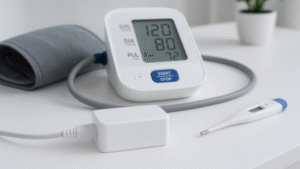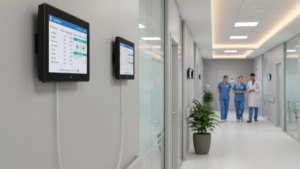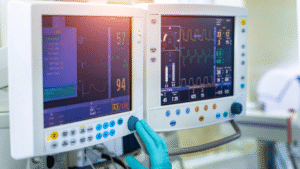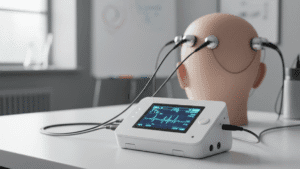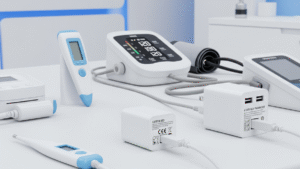Introduction
Smart electric beds have transcended their traditional role in hospitals and nursing homes, becoming a transformative addition to modern households. These advanced beds, equipped with motorized adjustments, massage functions, and smart controls, are redefining comfort and care. In medical environments, they alleviate patient discomfort, reduce pressure sores, and streamline caregiving tasks. In homes, they elevate sleep quality, promote relaxation, and enhance overall well-being.
At the core of every smart electric bed lies a critical component: the power adapter. Often overlooked, this “heart” of the system ensures stable, reliable, and safe power delivery, enabling seamless bed adjustments, quiet operation, and long-term durability. Selecting the right power adapter is not just a technical decision—it’s a commitment to user comfort, safety, and operational efficiency.
This guide explores the critical role of power adapters in smart electric beds, compares medical and home applications, highlights common challenges, and provides actionable insights for choosing the optimal adapter. Whether you’re a manufacturer, supplier, or end-user, understanding these factors will empower you to make informed decisions.
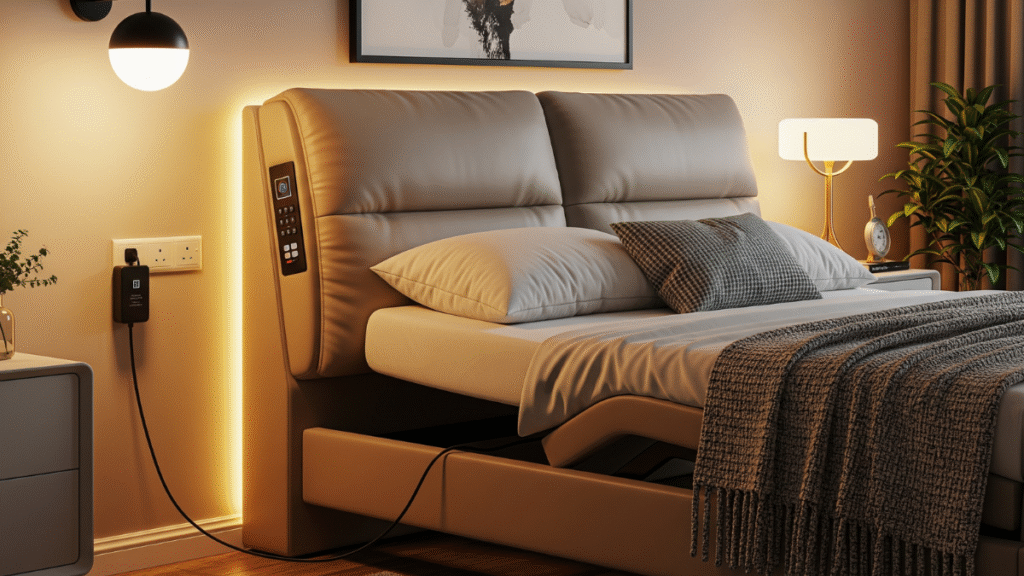
Why the Power Adapter is Critical for Smart Electric Beds
Smart electric beds rely on precise motor-driven movements—lifting, tilting, reclining, or delivering therapeutic massage. These functions depend entirely on the motor’s ability to receive consistent voltage and sufficient current. A subpar power adapter can lead to performance issues, such as sluggish movements, jerky transitions, or complete system failure, compromising user experience and safety.
A high-quality power adapter offers several key benefits:
- Consistent Power Delivery: Ensures smooth and precise bed adjustments without interruptions.
- Enhanced Safety: Protects users from electrical hazards through robust insulation and compliance with safety standards.
- Extended Lifespan: Reduces wear on motors and components, minimizing maintenance costs.
- Quiet Operation: Maintains a peaceful environment, critical for both medical and home settings.
- Energy Efficiency: Optimizes power consumption, reducing costs and environmental impact.
Choosing the right adapter is not just about meeting technical specifications—it’s about delivering a reliable, safe, and comfortable experience for users.
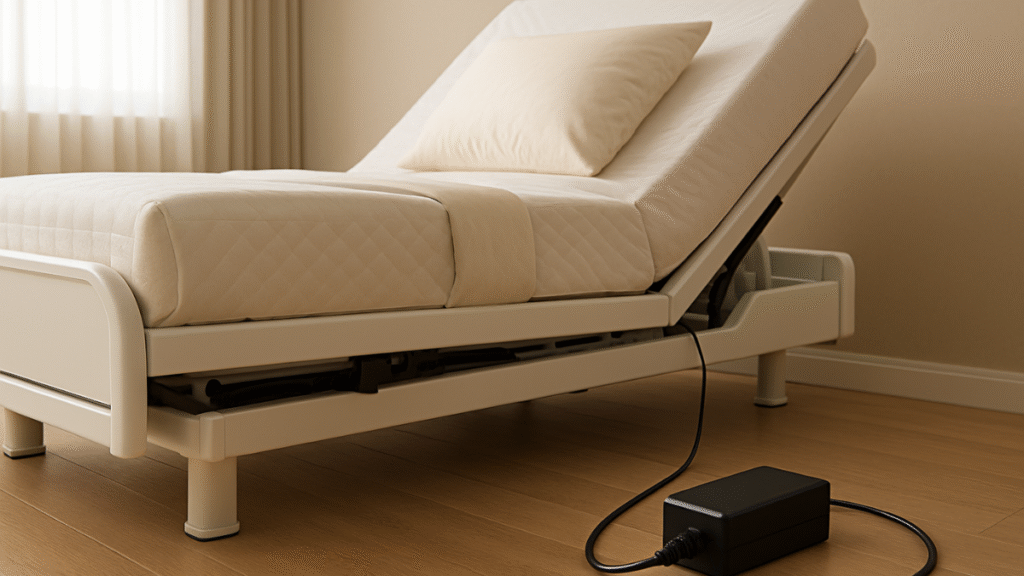
Medical vs. Home Smart Bed Power Requirements
The power adapter requirements for smart electric beds vary significantly between medical and home applications due to differences in usage patterns, safety standards, and environmental demands. Below is a detailed comparison:
| Requirement | Medical Smart Bed | Home Smart Bed |
|---|---|---|
| Safety Certification | Must comply with stringent IEC 60601-1 and IEC 60601-1-2 standards, covering leakage current, insulation, and electromagnetic compatibility (EMC). | Typically adheres to IEC 62368-1 for household appliances; premium models may adopt medical-grade certifications for added reliability and market appeal. |
| Stability | Designed for 24/7 operation with frequent, high-load adjustments (e.g., patient repositioning). | Requires stable performance for fewer daily adjustments, focusing on long-term reliability for occasional use. |
| Noise | Ultra-low noise levels to avoid disturbing patients or interfering with sensitive medical equipment. | Quiet operation is critical for nighttime comfort, ensuring minimal disruption during sleep. |
| Form Factor | Often desktop-style or external adapters for easy maintenance and replacement in clinical settings. | Prefers compact wall-plug adapters to save space and integrate seamlessly into home environments. |
| Durability | Built for high-intensity, frequent use in demanding environments like hospitals or nursing homes. | Designed for moderate use but still requires a long lifespan for years of reliable home operation. |
Key Takeaways
- Medical Beds: Prioritize safety, durability, and low noise due to continuous use and proximity to sensitive medical devices.
- Home Beds: Focus on user-friendly design, compact form factors, and quiet performance to enhance sleep quality and home aesthetics.
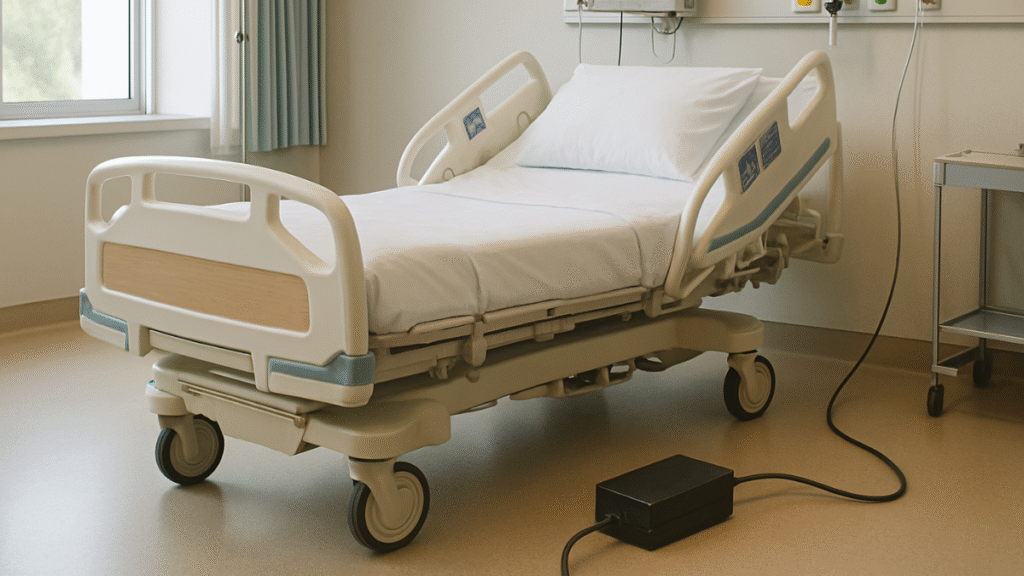
Common Problems and Risks of Poor Power Adapter Selection
Choosing an inadequate power adapter can lead to operational inefficiencies, safety hazards, and user dissatisfaction. Below are the most common issues and their implications:
- Unstable Voltage: Causes jerky or incomplete bed movements, leading to discomfort and potential motor damage.
- Insufficient Power Output: Results in slow motor response, especially during startup, reducing the bed’s responsiveness.
- Overheating: Shortens the adapter’s lifespan and poses fire risks, particularly in high-load medical applications.
- Excessive Noise: Disrupts rest in home settings or interferes with medical equipment in hospitals, compromising patient care.
- Lack of Certification: Fails to meet regulatory or tender requirements, limiting market access and risking legal non-compliance.
- Incompatibility: Incorrect voltage, current, or connector types can render the bed inoperable or unsafe.
These risks highlight the importance of selecting a power adapter that aligns with the specific needs of the smart bed and its intended environment.
Key Factors for Selecting the Right Power Adapter
To ensure optimal performance, safety, and longevity, consider the following factors when choosing a power adapter for smart electric beds:
1. Power Capacity
- Select an adapter with 20–30% extra capacity to handle inrush current during motor startup.
- Example: A bed requiring 50W should use an adapter rated at 60–65W to ensure smooth operation under peak loads.
2. Safety Certifications
- Medical Beds: Must comply with IEC 60601-1 (safety) and IEC 60601-1-2 (EMC) to ensure patient safety and compatibility with medical equipment.
- Home Beds: Require at least IEC 62368-1 certification; additional certifications like CE, UL, or CB enhance export marketability.
- Verify certifications match the target market’s regulatory requirements.
3. Electromagnetic Compatibility (EMC)
- Ensure the adapter does not emit electromagnetic interference (EMI) that could disrupt nearby electronics, such as medical monitors or home entertainment systems.
- Look for adapters tested for low EMI and compliance with relevant EMC standards.
4. Protection Features
- Over-Voltage Protection (OVP): Prevents damage from voltage spikes.
- Over-Current Protection (OCP): Safeguards against excessive current draw.
- Short-Circuit Protection: Ensures safety in case of wiring faults.
- Over-Temperature Protection (OTP): Mitigates overheating risks, extending adapter lifespan.
5. Operating Temperature Range
- Choose adapters suited to the target environment (e.g., 0–40°C for homes, broader ranges for hospitals with variable conditions).
- Ensure the adapter maintains performance in humid or dusty environments, common in medical settings.
6. Form Factor and Connectors
- Wall-Plug Adapters: Ideal for home beds, requiring compatibility with local socket designs and minimal strain on cables.
- Desktop Adapters: Preferred for medical beds, offering easy access for maintenance and robust cable management.
- Ensure connectors match the bed’s input requirements (e.g., barrel connectors, USB-C, or proprietary plugs).
7. Noise Levels
- Select adapters with low-noise designs to maintain a quiet environment, especially critical for nighttime use or medical settings.
- Look for adapters with high-quality components to minimize electrical hum or vibration.
8. Customization Options
- Consider OEM/ODM services for tailored solutions, such as specific plug types, cable lengths, or voltage/current configurations.
- Customization ensures compatibility with unique bed designs and market-specific requirements.
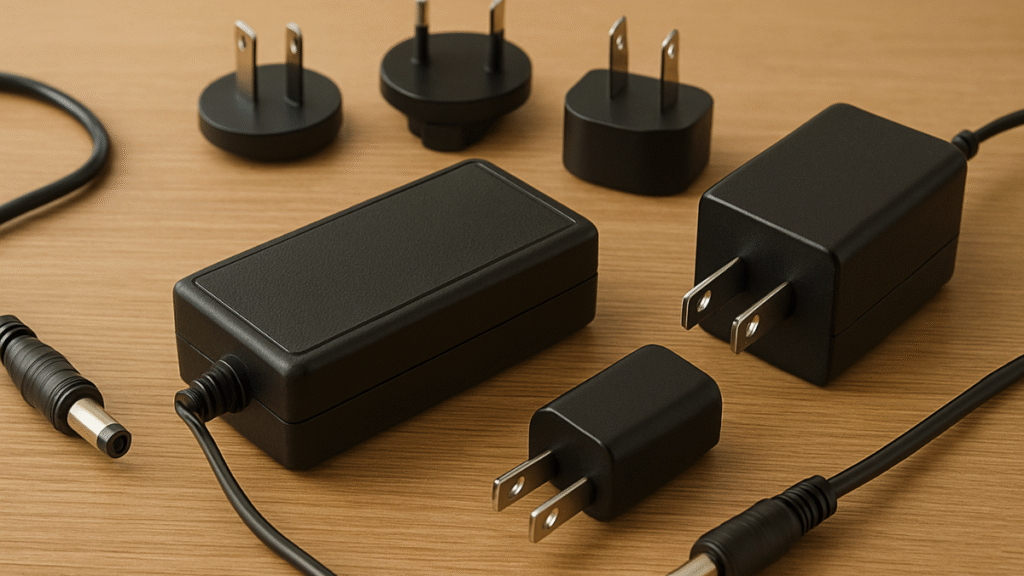
Our Power Adapter Solutions
We offer a comprehensive range of power adapters designed to meet the diverse needs of both medical and home smart electric beds. Our solutions combine cutting-edge technology, rigorous safety standards, and user-focused design to deliver unparalleled performance.
- Power Range: 24W–120W, covering a wide variety of bed types and motor requirements.
- Medical-Grade Models: Fully compliant with IEC 60601-1 and IEC 60601-1-2, ensuring safety and reliability in clinical environments.
- Home-Grade Models: Meet IEC 62368-1 standards, with optional medical-grade upgrades for premium home beds.
- Low-Noise Design: Engineered for silent operation, enhancing user comfort in both medical and home settings.
- High Stability: Advanced circuitry ensures consistent voltage and current, even under high loads.
- OEM/ODM Customization: Tailored plug types, cable lengths, and power specifications to match specific bed designs and market needs.
- Global Certifications: CE, UL, CB, and more, enabling seamless market entry worldwide.
Our adapters are built to deliver durability, safety, and efficiency, making them the ideal choice for manufacturers and suppliers aiming to enhance their smart bed offerings.
Real-World Case Studies
Medical Application: European Nursing Home Supplier
A leading European supplier of nursing home equipment faced frequent bed malfunctions and noise complaints with their existing power adapters. After switching to our 60W medical-grade adapter, they achieved:
- 45% Reduction in Malfunction Rates: Stable power delivery eliminated jerky movements and motor failures.
- Zero Nighttime Noise Complaints: Ultra-low-noise design ensured a peaceful environment for patients.
- Full Compliance: Adapters met IEC 60601-1 and IEC 60601-1-2 standards, satisfying regulatory audits.
Home Application: Premium Smart Bed Brand
A US and EU smart bed brand sought a reliable power adapter for their premium home models. By adopting our 36W wall-plug adapter, they achieved:
- Dual Certification: Passed UL and CE standards, enabling sales in both markets.
- 98% Positive Amazon Rating: Compact, quiet, and reliable performance boosted customer satisfaction.
- Enhanced Market Appeal: Medical-grade features added a premium selling point, differentiating their product.
These case studies demonstrate how the right power adapter can transform operational efficiency, user satisfaction, and market success.
Conclusion
The power adapter is the unsung hero of smart electric beds, ensuring smooth operation, user safety, and long-term reliability. Whether in a bustling hospital ward or a tranquil home bedroom, the right adapter delivers unmatched comfort, performance, and peace of mind. By prioritizing power capacity, safety certifications, EMC performance, and user-friendly design, manufacturers and suppliers can elevate their smart bed offerings to meet the demands of diverse markets.
Choosing the right power adapter is not just a technical decision—it’s an investment in user well-being and product excellence. With our comprehensive range of medical and home-grade adapters, we empower you to create smart beds that redefine comfort and care.


